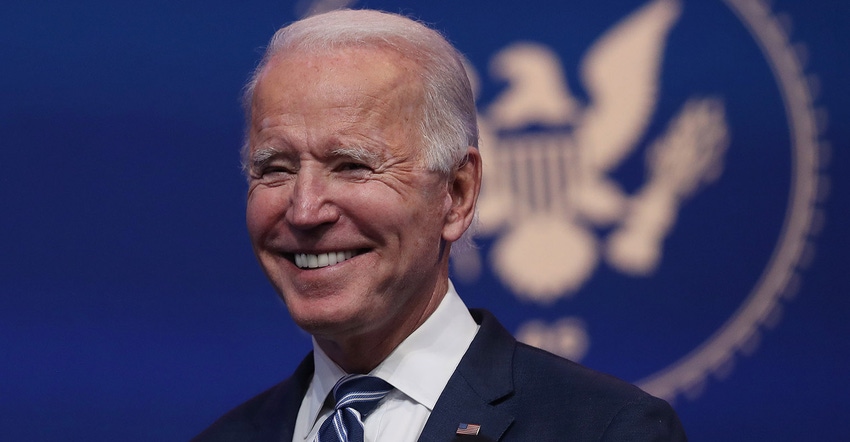
With the presidential inauguration of former vice president Joe Biden expected this month, it is time to look at how the future president may treat agriculture.
Let’s start with Biden’s and Vermont Sen. Bernie Sanders’ 110-page unity task force (UTF) list of policy recommendations, released last July before the Democratic convention.
The U.S. agricultural sector, according to USDA, contributed $1.109 trillion to the U.S. gross domestic product in 2019; agriculture and the food sectors were responsible for 22.2 million jobs. Of this 22 million, approximately 13 million jobs were in the food service, eating and drinking establishments. Given this impact on our society, you could imagine the Biden-Sanders UTF might devote at least a page to agriculture and ranching. One must search in vain to even find the word agriculture in the Biden-Sanders report.
On page 51, there is a small section dealing with “Agriculture and Carbon Sequestration in the Land Sector.” According to the document, “The Unity Task Force understands that floods, droughts, President Trump’s failed and reckless trade war, and the COVID-19 pandemic are making it difficult for farmers and people in rural America to earn a good living, pass their farm on to the next generation, and straining farmers’ health.” The limited discussion of agriculture says the Biden-Sanders unity plan will expand federal incentives to build a more equitable food system, increase soil health and water holding capacity, and conserve marginal farmland.
The policy framework will survey emissions and natural carbon sequestration from the forestry and agricultural sectors and will plant 16 billion new native and non-invasive trees by 2050. Planting of these trees will be a priority in low-income areas and communities of color.
Large livestock farms targeted?
The plan will also protect rural communities from air pollution and algal blooms, plus it “…will stand up to corporate polluters who harm rural communities.” (Translated: be aware if you have a concentrated feeding operation.)
The key discussion regarding agriculture falls under a section entitled “Climate Unity Task Force Recommendations.” One sentence jumps out from this document: “…using executive action to reduce harmful methane and carbon pollution from the energy sector.” Methane is in natural gas, but it is also a result of animal production, manure management, and rice production. Ruminants such as cattle create large methane emissions so when you read between the lines, methane not only from natural gas but also from concentrated feeding operations appear to be a target of the Biden-Sanders unity plan.
One of the major supporters of Biden and Sanders is the Sierra Club, which claims “CAFOs (concentrated animal feeding operations) are resource-intensive and unsustainable.” The Sierra Club also claims that “CAFOs animal-raising practices are neither economically viable or sustainable.”
So, when the Biden-Sanders unity plan indicates it will use Executive Orders against methane reduction, it might be wise for CAFO owners to start evaluating ways to reduce methane from their operations.
The Biden-Sanders Unity Plan is a blueprint for the Biden administration, expected to be sworn in on January 20, 2021. The plan, like most political documents, may provide a roadmap for what agriculture will deal with during the next four years. The plan is easy to find (here) and if you are in agriculture, ranching, or food production, reading the plan may be worthwhile! Happy New Year.
Note: Gary Baise organized President Trump’s agricultural team of advisers.
The opinions of the author are not necessarily those of Farm Futures or Farm Progress.
About the Author(s)
You May Also Like




